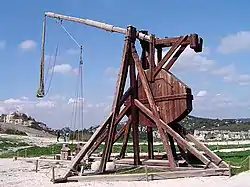trebuchet
See also: trébuchet
English

trebuchet
Alternative forms
- trepeget (obsolete)
Etymology
From Old French trebuchet, trebuket et al. (modern trébuchet), from trebuchier (“to overthrow, topple”), from tre- + *buchier, from Old French buc (“trunk of the body”), from Old Frankish *būk (“belly, trunk, torso”), from Proto-Germanic *būkaz (“belly, abdomen, trunk”), from Proto-Indo-European *bʰōw- (“to blow, swell”). Cognate with Old High German būh (“belly”), Old English būc (“belly, trunk”). More at bouk.
Pronunciation
Noun
trebuchet (plural trebuchets)
- A medieval siege engine consisting of a large pivoting arm heavily weighted on one end.
- Medieval trebuchets are said to have been capable of launching 90kg projectiles over distances of more than 300 meters, making them more powerful than most pre-modern types of catapult.
- A torture device for dunking suspected witches by means of a chair attached to the end of a long pole.
Translations
trebuchet
|
|
Old French
Etymology
From the verb trebuchier.
Pronunciation
- IPA(key): /trɛ.byˈtʃɛt/
Noun
trebuchet m (oblique plural trebuchez or trebuchetz, nominative singular trebuchez or trebuchetz, nominative plural trebuchet)
This article is issued from Wiktionary. The text is licensed under Creative Commons - Attribution - Sharealike. Additional terms may apply for the media files.